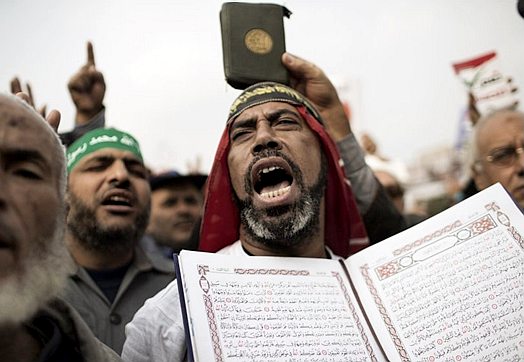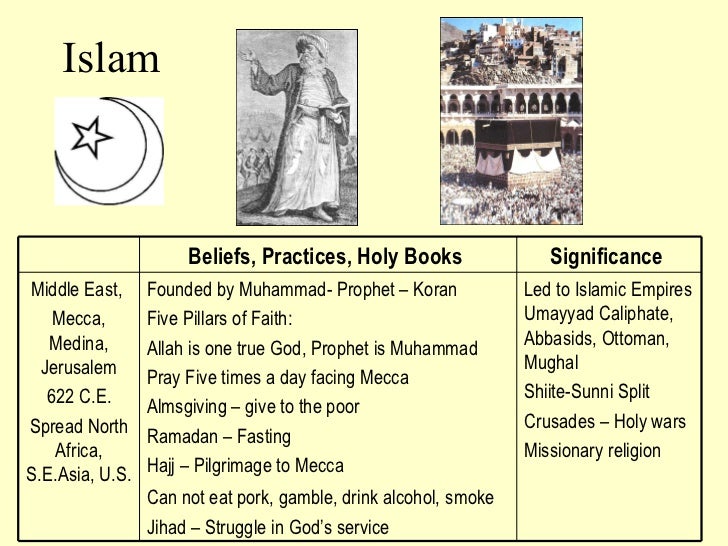In the comments on Geert Wilders’ open letter to Pope Francis, a reader named MH indicated that he was unfamiliar with — or was pretending to be unfamiliar with — the Islamic doctrine of abrogation as it applies to contradictory verses within the Koran.
In a nutshell, any earlier verse of the Koran is considered “abrogated” if a later verse contradicts it. The chronology of the suras of the Koran has been well-established by a consensus of Islamic scholars, so an observant Muslim can be in no doubt as to whether any particular verse of the Koran is binding upon him under Islamic law.
Retired U.S. Army Major Stephen Coughlin is one of the foremost experts on Islamic law in the Western world. Several years ago I had the privilege of helping with the editing of material that Steve was putting together, including the following section on the Koranic basis for the doctrine of abrogation. The text below is reproduced with his permission.
The Doctrine of Abrogation
By Maj. Stephen Coughlin
At the very pinnacle of Islamic law is the Koran, which is the uncreated word of God as revealed through his Prophet.
So what is abrogation?
This is what Imran Ahsan Khan Nyazee has to say about abrogation in Islamic Jurisprudence:[1]
The law was laid down in the period of the Prophet (peace be unto him) gradually and in stages. The aim was to bring a society steeped in immorality to observe the highest standards of morality. This could not be done abruptly. It was done in stages, and doing so necessitated repeal and abrogation of certain laws.
As you can see, Nyazee acknowledges that the Koran contradicts itself. Upon discovering this fact, someone who knows little about Islam might say, “The Koran contradicts itself. Doesn’t this mean it’s broken?” But anyone who takes the time to look into the scholarship will learn that is well understood in Islam that the Koran contradicts itself. This fact is explained, and taken into account. There are methods for dealing with it.
This becomes significant when non-Muslims approach a Muslim cultural expert or “moderate” to ask about certain verses of the Koran that are cited by radicals to justify their violent jihad. The cultural expert or “moderate” will respond with something like this: “You (infidel) must read from the entire body of the Koran to understand the true meaning. Those radicals cherry-pick from the back of the Koran.”

With this reply the cultural expert gives the impression that he does not agree with the radicals, but he never actually says that what they cherry-pick is wrong.
So what is the Koranic basis for the doctrine of abrogation?
It is a Qur’an which We have divided into parts from time to time, in order that thou mightest recite it to men at intervals: We have Revealed it by stages. (Qur’an 17:106)
Concerning this verse, the Qur’an commentator Yusuf Ali says:[2]
The marvel is that these parts, revealed at different times and in different circumstances, should fit together so closely and consistently as they do. All revelation is progressive. The previous revelations were also progressive. Each of them marked a stage in the world’s spiritual history. Man’s mind does not take in more than his spiritual state will have prepared him for. Allah’s revelation comes as a light to illuminate our difficulties and show us the way in actual situations that arise.
I sometimes run into very committed Christians who say, “We have progressive revelation in Christianity, too.” And my answer is: “There’s a pillar, go run your head into it!” When talking about Islamic concepts of progressive revelation, it is totally unprofessional to refer to Christian notions of progressive revelation.
Here is another verse covering the same subject:
When We substitute one revelation for another – and Allah knows best what He reveals in stages — They say, “Thou art but a forger”: But most of them understand not. (Qur’an 16:101)
And once again, a comment by Yusuf Ali:[3]
The doctrine of progressive revelation from age to age and time to time does not mean that Allah’s fundamental Law changes. It is not fair to charge a Prophet of Allah with forgery because the Message, as revealed to him, is in a different form from that revealed before, when the core of the Truth is the same, for it comes from Allah.
Imagine that you are in 7th-century Arabia. Muhammad is receiving a revelation, and it contradicts something from an earlier revelation. Someone in the crowd stands up and says, “Dammit, Muhammad, you’re making this stuff up. You’re just making it up!” This causes a lot of controversy, and Muhammad then has another revelation — remember, he got them over a twenty-year period — in which Allah reveals that when he substitutes one revelation for another, he knows best what he does in stages. So how dare you accuse Muhammad of making this stuff up? You don’t understand!
The final Koranic verse on progressive revelation:
None of Our revelations do we abrogate or cause to be forgotten, but we substitute something better or similar; knowest thou not that Allah hath power over all things? (Qur’an 2:106)
Thus we have three different citations from the Koran in which Allah says he reveals things in stages, and that with each stage he abrogates the previous stages. We would expect — because it is the uncreated word of Allah — that what was said later would overrule what was said earlier. And any Islamic law which did not reflect this fact would be suspect.
That means that if the radicals are cherry-picking chronologically from the back of the Koran, they are correct.




